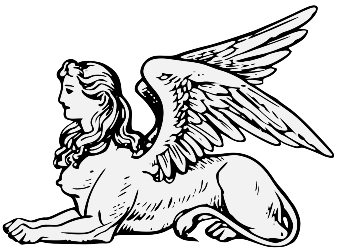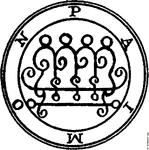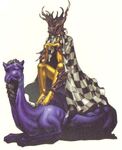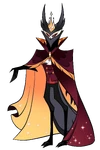Paimon or Paymon is one of the Kings of Hell, more obedient to Lucifer than other kings are, and has two hundred legions of demons under his rule. Paimon is depicted as a man with an effeminate face, wearing a precious crown, and riding a dromedary. Before him often goes a host demons with the shape of men, playing trumpets, cymbals, and any other sort of musical instruments.
Overview[]
He has a great voice and roars as soon as he comes, speaking in this manner for a while, until the conjurer compels him and then he answers clearly the questions he is asked. When the conjurer invokes this demon he must look towards the northwest, for there is where he has his house, and when Paimon appears he must be allowed to ask what he wishes and be answered, in order to obtain the same from him.
Paimon teaches all arts, philosophy and sciences, and secret things; he can reveal all mysteries of the Earth, wind and water, what the mind is, and everything the conjurer wants to know, gives good familiars, dignities and confirms them, binds men to the conjurer's will.
Paimon in Christian and Occult Demonologies[]
Throughout history multiple formalized classifications of demons have been proposed. None of them however are considered canon by modern mainstream Christian denominations. Instead, lists of formalized demonologies tend to remain popular in occult traditions.
Paimon in the Pseudomonarchia Daemonum[]
The Pseudomonarchia daemonum, or False Monarchy of Demons, by the Dutch occultist Johann Weyer, was published as an appendix to his book titled De praestigiis daemonum, or On the Tricks of Demons, in 1577. The description of Paimon from the Pseudomonarchia daemonum is as follows:
| “ | Paimon is more obedient in Lucifer than other kings are. Lucifer is heere to be understood he that was drowned in the depth of his knowledge: he would needs be like God, and for his arrogancie was throwne out into destruction, of whome it is said; Everie pretious stone is thy covering (Ezech. 88 [28.13].). Paimon is constrained by divine vertue to stand before the exorcist; where he putteth on the likenesse of a man: he sitteth on a beast called a dromedarie, which is a swift runner, and weareth a glorious crowne, and hath an effeminate countenance. There goeth before him an host of men with trumpets and well sounding cymbals, and all musicall instruments. At the first he appeereth with a great crie and roring, as in Circulo [*the book Empto.] Salomonis, and in the art is declared. And if this Paimon speake sometime that the conjuror understand him not, let him not therefore be dismaied. But when he hath delivered him the first obligation to observe his desire, he must bid him also answer him distinctlie and plainelie to the questions he shall aske you, of all philosophie, wisedome, and science, and of all other secret things. And if you will knowe the disposition of the world, and what the earth is, or what holdeth it up in the water, or any other thing, or what is Abyssus, or where the wind is, or from whence it commeth, he will teach you aboundantlie. Consecrations also as well of sacrifices [offerings, libations] as otherwise may be reckoned. He giveth dignities and confirmations; he bindeth them that resist him in his owne chaines, and subjecteth them to the conjuror; he prepareth good familiars, and hath the understanding of all arts. Note, that at the calling up of him, the exorcist must looke towards the northwest [better: North], bicause there is his house. When he is called up, let the exorcist receive him constantlie without feare, let him aske what questions or demands he list, and no doubt he shall obteine the same of him. And the exorcist must beware he forget not the creator, for those things, which have beene rehearsed before of Paimon, some saie he is of the order of dominations; others saie, of the order of cherubim. There follow him two hundred legions, partlie of the order of angels, and partlie of potestates. Note that if Paimon be cited alone by an offering or sacrifice, two kings followe him; to wit, Beball & Abalam, & other potentates: in his host are twentie five legions, bicause the spirits subject to them are not alwaies with them, except they be compelled to appeere by divine vertue.[1] | ” |
Paimon in the Lemegeton Clavicula Salomonis (Ars Goetia)[]
The Lemegeton Clavicula Salomonis or Lesser Key of Solomon is an anonymously written book of demonology that is believed to have been complied sometime during the 17th century CE. The work is divided into five books, the first of which, known as the Ars Goetia, lists seventy-two demons. The Ars Goetia is heavily based off of Johann Weyer's Pseudomonarchia daemonum.
In 1904, the British occultist and founder of the religion of Thelema, Aleister Crowley, published a version of the Lesser Key of Solomon which was translated by another British occultist, Samuel Liddell MacGregor Mathers, and contained additional invocations added by Crowley. The Ars Goetia's passage on Paimon from the 1904 version is as follows:
| “ | The Ninth Spirit in this Order is Paimon, a Great King, and very obedient unto LUCIFER. He appeareth in the form of a Man sitting upon a Dromedary with a Crown most glorious upon his head. There goeth before him also an Host of Spirits, like Men with Trumpets and well sounding Cymbals, and all other sorts of Musical Instruments. He hath a great Voice, and roareth at his first coming, and his speech is such that the Magician cannot well understand unless he can compel him. This Spirit can teach all Arts and Sciences, and other secret things. He can discover unto thee what the Earth is, and what holdeth it up in the Waters; and what Mind is, and where it is; or any other thing thou mayest desire to know. He giveth Dignity, and confirmeth the same. He bindeth or maketh any man subject unto the Magician if he so desire it. He giveth good Familiars, and such as can teach all Arts. He is to be observed towards the West. He is of the Order of Dominations. He hath under him 200 Legions of Spirits, and part of them are of the Order of Angels, and the other part of Potentates. Now if thou callest this Spirit Paimon alone, thou must make him some offering; and there will attend him two Kings called LABAL and ABALI , and also other Spirits who be of the Order of Potentates in his Host, and 25 Legions. And those Spirits which be subject unto them are not always with them unless the Magician do compel them. His Character is this which must be worn as a Lamen before thee, etc.[2] | ” |
Paimon in the Dictionnaire Infernal[]
The Infernal Dictionary is a book of demonology written in 1818 by the French occultist Jacques Auguste Simon Collin de Plancy. The entry for Paimon (Paymon) is as follows:
| “ | Paymon, one of the kings of hell. If he shows himself to the exorcists, it is in the form of a man riding a dromedary, crowned with a sparkling jeweled diadem, with a woman's face. Two hundred legions, part of the order of Angels, part of the order of Powers, obey him. If Paymon is evoked by some sacrifice or libation, he appears accompanied by the two great princes Bébal and Abalam.[3] | ” |
Gallery[]
References[]
| The 72 Demons of The Ars Goetia | |
|---|---|
| Kings | Asmodeus • Bael • Balam • Beleth • Belial • Paimon • Purson • Vine • Zagan |
| Dukes | Abigor • Aim • Agares • Allocer • Amduscias • Astaroth • Barbatos • Bathin • Buné • Berith • Crocell • Dantalion • Flauros • Focalor • Gremory • Gusion • Murmur • Sallos • Valefor • Vapula • Vepar • Vual • Zepar |
| Princes | Gaap • Ipos • Orobas • Seere • Stolas • Sytry • Vassago |
| Marquises | Amon • Andrealphus • Andras • Cimejes • Decarabia • Forneus • Gamigin • Leraje • Marchosias • Nebiros • Orias • Phenex • Ronové • Sabnock • Shax |
| Counts | Andromalius • Bifrons • Furfur • Halphas • Raum |
| Knights | Furcas |
| Presidents | Buer • Botis • Foras • Glasya-Labolas • Marbas • Morax |
| Great Presidents | Amy • Camio • Haagenti • Malphas • Ose • Volac |





